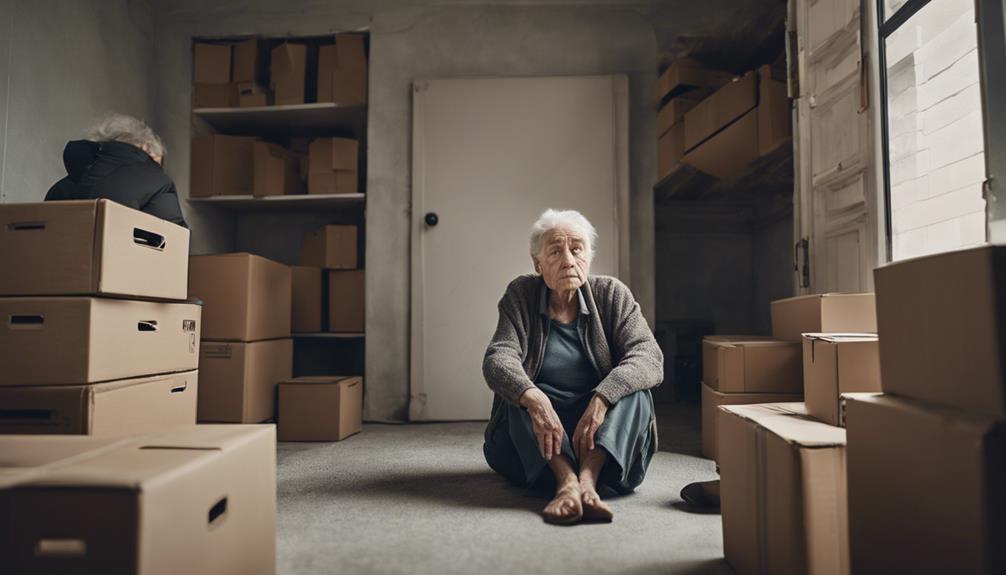Moving elderly parents back home can result in heartache and remorse. Families may encounter obstacles such as loss of independence, emotional stress, declining health, and financial strain. The impact on mental well-being, adjusting to a new environment, sibling dynamics, and unmet caregiving expectations can be daunting. Managing feelings of isolation and separation is crucial. Recognize emotions and work towards maintaining a connection with parents. Being aware of these challenges can help in better preparing for the role of caregiver. Additional resources are available to assist in navigating this challenging path.
Key Takeaways
- Feelings of remorse and autonomy loss when relocating parents to care facilities.
- Financial strain from high care facility costs impacting families.
- Emotional turmoil, stress, and guilt experienced by caregivers.
- Disruption of family dynamics and strained relationships from caregiving responsibilities.
- Coping with loneliness, burnout, and complex family dynamics while adjusting to new environments.
The Struggle With Independence Loss
Relocating our elderly parents into a care facility or nursing home can evoke a deep sense of remorse as we grapple with the heart-wrenching struggle of independence loss. Observing our aging parents face a diminishing sense of autonomy can be demanding. The move to a care facility often entails relinquishing familiar surroundings and routines, which can be particularly challenging for elderly individuals who value their independence. As adult children, we may find ourselves caught between wanting to guarantee our parents' safety and well-being while also respecting their desire for freedom. The decision can be emotionally taxing as we navigate the balance between offering care and maintaining their dignity. Additionally, the harsh realities of nursing homes, such as understaffing or a lack of personalized attention, may raise concerns about whether our loved ones are truly receiving the level of care they need. Despite these challenges, ensuring our parents’ comfort and security becomes the driving force behind these difficult choices.
The decision to transfer aging parents into a care facility isn't an easy one. It can evoke feelings of guilt and sadness as we navigate the complexities of balancing their needs with our own limitations. Understanding that this shift signifies a significant change in their lives is vital. Providing support and reassurance during this period can help alleviate some of the emotional burdens associated with the loss of independence.
Emotional Toll on Family Dynamics

When elderly parents move home, the emotional toll on family dynamics can be significant. Conflicting opinions on care decisions and lifestyle changes may lead to disagreements among family members.
Caregiver stress can increase, relationships may be strained, and challenges can arise during this shift period.
Family Conflicts Arise
Managing the care arrangements and living situations for elderly parents at home often leads to conflicting opinions within families, causing an emotional toll on our dynamics. When family conflicts arise, differing views on how to best care for our elderly parents can create tension and strain our relationships. These disagreements may stem from varying beliefs on the level of care needed, financial responsibilities, or even personal sacrifices required. Such conflicts can result in feelings of guilt, resentment, and frustration among family members.
It's essential to address these disagreements openly and respectfully, considering everyone's perspectives and finding common ground. By fostering understanding and communication, we can navigate these family conflicts with compassion and unity, ensuring the well-being of our elderly parents while preserving harmony within our family.
Caregiver Stress Increases
Experiencing increased caregiver stress can have a significant impact on family dynamics, leading to strained relationships and emotional turmoil. When caregivers face overwhelming responsibilities, it can trigger feelings of guilt, frustration, and isolation within the family unit.
Family members may find it challenging to comprehend the full extent of caregiver stress and its consequent effects on relationships. The balance of roles and responsibilities within the family can be disrupted due to the emotional strain of caregiving. This disruption often leads to communication challenges and difficulties in making decisions collectively.
Understanding and addressing caregiver stress is vital in maintaining healthy family dynamics and supporting both the caregivers and the elderly parents effectively.
Relationships Strained and Challenged
Handling the emotional toll of caregiving can strain and challenge family relationships, creating tension and conflicts within the dynamics. Balancing caregiving responsibilities with existing family roles can lead to communication breakdowns and misunderstandings. Caregivers often find themselves juggling feelings of guilt, frustration, and resentment within the family structure, impacting their emotional well-being.
The challenges of moving elderly parents home can put a significant strain on family relationships, testing the patience and understanding of all involved. It's important to address these emotional challenges openly and honestly within the family unit to prevent long-term damage to relationships. Seeking support from each other and communicating effectively can help navigate these difficulties and strengthen family bonds during this trying time.
Unforeseen Health Declines Post-Move

Moving elderly parents home can unexpectedly lead to declines in their health, exacerbated by the stress and emotional toll of the change. The shift can trigger health issues such as increased anxiety and depression in elderly parents. The change in environment and routine post-move can contribute to these challenges, impacting their mental and emotional well-being. Moreover, unfamiliar surroundings and decreased social interactions can worsen the situation, leading to a decline in their overall health.
In addition, the physical health of elderly parents may deteriorate post-move due to disruptions in their healthcare routines and limited access to medical facilities. This unforeseen decline in health can intensify the regret felt by caregivers, adding to their emotional burden. It's important to be aware of these potential health issues that may arise after relocating elderly parents home, and to proactively address their needs to safeguard their well-being and quality of life.
Financial Burden of Care Facilities

Care facilities can be expensive, with the average cost of a nursing home room in the U.S. reaching almost $8,000 per month.
Memory care facilities, which offer specialized care, can be even pricier, costing up to 20-30% more than standard assisted living facilities.
Planning and budgeting for these expenses are essential to avoid financial strain on both the elderly parents and their children.
Cost of Care
Exploring the financial terrain of care facilities for elderly parents can be a challenging task, given the substantial costs associated with different levels of care. When considering the cost of care, families may encounter various challenges such as:
- The average cost of a private room in a nursing home is around $8,821 per month, creating a significant financial burden for families.
- Assisted living facilities can cost approximately $4,051 per month, adding to the financial strain of caregiving for elderly parents.
- Home health care services can range from $21 to $24 per hour, contributing to the overall expenses of caring for elderly parents at home.
- Memory care facilities, specialized for individuals with dementia, can cost up to $7,698 per month, impacting the financial planning of caregivers.
- Long-term care insurance can help cover some of the costs of care facilities, but premiums and coverage limitations vary, requiring careful consideration.
Financial Challenges
Traversing the financial landscape of care facilities for elderly parents presents a significant challenge due to the substantial costs involved. Care facilities can range from $3,500 to $7,000 per month, creating a significant financial burden for families.
Unfortunately, Medicare usually doesn't cover long-term care in these facilities, leading to out-of-pocket expenses. Families may find themselves having to deplete savings or sell assets to cover these costs, impacting their financial stability.
The price of care facilities can differ based on the location, required level of care, and amenities provided. Some families consider Medicaid assistance to help with expenses, but it's worth mentioning that eligibility criteria and coverage limitations apply.
Planning ahead and exploring all financial options is essential when considering care facilities for elderly loved ones.
Budgeting for Care
Exploring the financial terrain of care facilities for elderly parents can be a challenging task, especially when exploring the significant costs involved. When budgeting for care facilities, families must navigate a complex landscape of expenses and funding options.
Here are some key points to keep in mind:
- Care facilities can cost an average of $4,000 to $7,000 per month, creating a significant financial burden for families.
- Medicare typically doesn't cover long-term care in facilities, leading families to rely on personal savings, insurance, or Medicaid.
- Some care facilities require a hefty entrance fee in addition to monthly costs, further adding to the financial strain on families.
- The cost of care facilities can vary based on location, level of care needed, and amenities provided, making budgeting important for families.
- Families may need to explore alternative financial options such as selling assets or accessing government assistance to afford care facility expenses.
Impact on Caregiver Mental Health

High levels of stress, anxiety, and depression often plague caregivers of elderly parents due to the demanding nature of their role. The emotional toll of caregiving can lead to burnout, feelings of isolation, and compromised well-being. Studies have shown that caregivers experience a 23% increase in stress hormones and a 15% decrease in antibody responses, impacting their immune system's ability to function at its best. It is important for caregivers to prioritize their mental health by seeking support, practicing self-care, and recognizing the signs of emotional exhaustion.
| Effects of Caregiving on Mental Health |
|---|
| Increased stress levels |
| Feelings of isolation |
| Emotional exhaustion |
Caregivers often report feelings of guilt, inadequacy, and sadness, which can further deteriorate their mental well-being. Recognizing the signs of mental strain and taking proactive steps to address them are essential in maintaining a healthy caregiver-parent relationship. Remember, caring for yourself is just as essential as caring for your loved one.
Conflicting Feelings of Guilt and Relief

Handling the decision to bring elderly parents home can stir up a mix of emotions, including conflicting feelings of guilt and relief for caregivers. As caregivers navigate this challenging path, it's imperative to acknowledge and address these emotions to provide the best care possible.
Here are some key points to keep in mind:
- Self-Care: Caregivers must prioritize their well-being to effectively support their elderly parents.
- Open Communication: Discussing feelings of guilt and relief with loved ones can help alleviate emotional burdens.
- Professional Support: Seeking guidance from healthcare professionals or support groups can offer valuable insights and coping strategies.
- Acceptance: Recognize that feeling both guilt and relief is normal and part of the caregiving journey.
- Balancing Act: Finding a balance between caregiving responsibilities and personal needs is crucial for long-term sustainability.
Challenges in Adjusting to New Environment

Adjusting to a new environment poses significant challenges for elderly parents, particularly when emotional connections to their previous home are involved. When assisting elderly parents in adjusting to a new living space, be sure to acknowledge their feelings of loss and sadness. Moving can disrupt their sense of familiarity and routine, causing stress and anxiety.
Changes in surroundings may lead to feelings of disorientation and confusion, especially for those with cognitive impairments. To ease this adaptation, create a comforting and familiar environment in their new home by incorporating cherished belongings and memories from their previous residence. Encourage them to explore their new surroundings gradually, allowing them to become more familiar with the area over time.
Patience and understanding are crucial as they navigate this change. Providing emotional support and reassurance can help alleviate their concerns and fears about the new environment. Remember, the process of adjusting to a new place takes time, so be patient and supportive throughout the journey.
Strained Relationships With Siblings

When caring for elderly parents, disagreements with siblings over decisions and responsibilities can strain relationships. It's common for siblings to have different views on what's best for their parents, leading to conflicts.
Unequal sharing of caregiving duties can also create tension and resentment among siblings.
Sibling Communication Challenges
Managing tense relationships with siblings can have a major impact on the decision-making process when it comes to bringing elderly parents home. Effective communication is key to maneuvering these challenges.
Here are some ways to address sibling communication difficulties:
- Active Listening: Take the time to genuinely hear and understand each sibling's perspective.
- Setting Boundaries: Establish clear boundaries to respect each other's opinions and space.
- Seeking Mediation: Consider involving a neutral third party to facilitate discussions and find common ground.
- Showing Empathy: Put yourself in your siblings' shoes to better understand their viewpoints.
- Collaborative Decision-Making: Work together as a team, valuing each sibling's input to make decisions that benefit your elderly parents.
Sibling Decision Disagreements
Strained relationships among siblings often arise due to conflicting viewpoints on decisions regarding the care of elderly parents, leading to heightened tensions and communication breakdowns. When siblings disagree on how to handle caregiving responsibilities, it can create rifts within the family.
Varying levels of involvement in being a family caregiver may lead to feelings of resentment and misunderstanding. Disagreements over financial matters, living arrangements, and medical decisions can further exacerbate these tensions.
It's important for siblings to communicate openly and work together as a team to make decisions in the best interest of their elderly parents. By fostering understanding and compromise, siblings can navigate these challenges more effectively and safeguard the well-being of their loved ones.
Unmet Expectations in Care Quality

Despite our best efforts, caregivers may find themselves facing unmet expectations in the quality of care provided when moving elderly parents home. It's vital to be prepared for potential challenges and uncertainties that may arise in this caregiving journey.
Here are some key points to think about:
- Communication is Key: Open and honest communication with your elderly parents and other family members is pivotal to understanding their needs and expectations.
- Seek Professional Help: Don't hesitate to consult healthcare professionals or seek guidance from support groups to make sure you're providing the best care possible.
- Set Realistic Goals: Establish realistic expectations for yourself and your parents' care, acknowledging that caregiving can be demanding and unpredictable.
- Self-Care Matters: Remember to take care of your own physical and emotional well-being to prevent burnout and provide better care for your loved ones.
- Adapt and Adjust: Be flexible and willing to adapt your caregiving approach as needed, seeking help when necessary to guarantee the best possible care for your elderly parents.
Coping With the Loneliness of Separation

As we navigate the challenges of caring for our elderly parents at home, coping with the loneliness that comes with separation becomes a significant aspect of our caregiving journey.
It's important to experience feelings of sadness and isolation when physically separated from our loved ones. To address this, staying connected through regular communication and visits can help bridge the emotional gap.
The physical distance between elderly parents and adult children may intensify feelings of loneliness, making it vital to find ways to maintain a sense of closeness. Sharing photos, memories, and engaging in activities together remotely can alleviate the sense of separation.
Seeking support from friends, family, or joining support groups can provide comfort and understanding during this period of separation. By acknowledging and addressing these feelings of loneliness, we can take proactive steps to make sure our elderly parents feel connected and cared for, even when apart.
Frequently Asked Questions
Should I Feel Guilty About Moving Away From My Elderly Parents?
We shouldn't feel guilty about moving away from elderly parents. It's natural to worry, but we can find ways to stay connected and guarantee their well-being. Communicate openly, explore alternatives, and prioritize both their needs and our own.
How Often Should You Visit Your Elderly Mother?
We visit our elderly mother regularly, balancing her needs and independence. Communication is crucial in understanding her preferences. Spending quality time together strengthens our bond and provides emotional support. Our visits bring joy and comfort.
What to Do When an Elderly Parent Moves in With You?
When an elderly parent moves in with us, we prioritize establishing clear boundaries, ensuring safety, discussing finances, and fostering open communication. We seek external support for guidance. Together, we navigate challenges and cherish moments, fostering a harmonious home.
Why Am I so Frustrated With My Elderly Mother?
We feel frustrated with our elderly mother due to communication challenges, role reversals, and differing expectations. When she resists help or refuses medical advice, it adds to our stress. Balancing caregiving and self-care is essential for a healthier relationship.
Conclusion
To sum up, moving elderly parents home can be a difficult decision with lasting consequences.
It's important to carefully consider all aspects of the move, including emotional, financial, and health implications.
Remember, it's better to be safe than sorry when it comes to the well-being of your loved ones.
So, take your time, weigh your options, and make the best decision for your family.
After all, a happy parent is a happy home!








